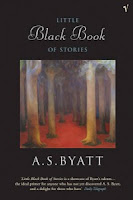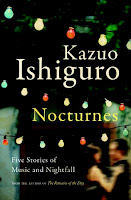 I had wanted to finish either The Wig My Father Wore or The Third Policeman by St. Patrick’s Day as my monthly “themed” reading. Oddly, both books are truly absurd, which is why I only finished one of them. I’m not sure if absurdist fiction is necessarily for me — in a way, I don’t like to be confused or feel like a story is convoluted just for the sake of making a point. Sure, I read Beckett in university and enjoyed it at the time but these days I just don’t have the concentration it requires to read something that deems the absurd a necessary plot point. Hence my abandonment of The Third Policeman.
I had wanted to finish either The Wig My Father Wore or The Third Policeman by St. Patrick’s Day as my monthly “themed” reading. Oddly, both books are truly absurd, which is why I only finished one of them. I’m not sure if absurdist fiction is necessarily for me — in a way, I don’t like to be confused or feel like a story is convoluted just for the sake of making a point. Sure, I read Beckett in university and enjoyed it at the time but these days I just don’t have the concentration it requires to read something that deems the absurd a necessary plot point. Hence my abandonment of The Third Policeman.
And while Anne Enright’s The Wig My Father Wore dips its toes into the same kind of storytelling, there’s at least somewhat of a plot to keep you motivated. Grace, the novel’s protagonist, opens her door one evening after work (she’s a producer for a Dating Game-style show in Ireland) to discover an angel on her stoop. Stephen lives with her for a time. They have cryptic conversations and an even stranger love affair all the while he’s changing her body — literally.
There are parts to Enright’s writing that are almost unbearably beautiful. Grace finds herself in a difficult time in her life — her job’s in peril and her father’s dying — and it seems the angel has come along at just the right time. He helps her to come to terms with her life, but he also comes with a bit of havoc (imagine your body disappearing before your eyes, imagine!), and as Grace looks back at her childhood, at her father’s strange, inappropriate wig, the story makes sense.
But often, aspects of this book just don’t come together in the same way, and its far too convoluted for my tastes. Imagine a chicklit scenario (young woman trying to find herself working for a dating television show), with a bit of Legion (except he’s not a wicked angel, but someone in between trying to earn his wings), and BBC Drama (the dying father) thrown in — the book simply doesn’t make sense.
It’s a shame because I adored, adored The Gathering. I felt like all of Enright’s formidable talents, her sharp perception, her angst with family life, was put to good use. In The Wig My Father Wore any good will I had about the former book is lost the moment I reread sections where Stephen the angel attempts to become a contestant on her dating game show. I mean, really? That said, I marked more than one passage as I was reading, especially the more domestic sections with her mother.
But in this one sentence, squeezed my heart as well: “I woke up grateful and sick with grief, as if I could not carry my heart anymore; it had burst and spread, like an old yolk.”
Keep those sentences and toss back the rest.
WHAT’S UPCOMING: Still going to trudge to the end of The Third Policeman, if only because it’s on the 1001 Books list and I hate not finishing books. There’s always something good in them, even if it’s just one sentence that sticks with me. Then I’m going to read for work, and maybe finish the third Stieg Larsson galley that a friend sent over. It’s awesome. I think the charges he’s anti-feminist are bollocks, BTW.
Whew, that’s enough rambling for today.
READING CHALLENGES: Enright’s Irish, so that’s one for Around the World in 52 Books.








